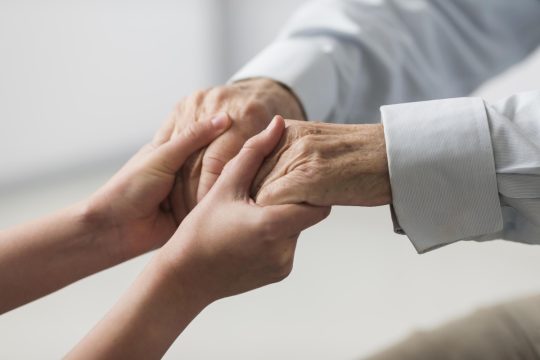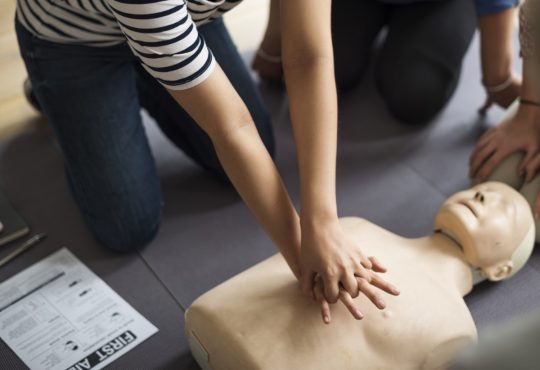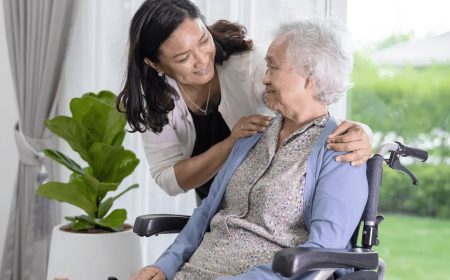Caring for a senior loved one can feel daunting and tedious. However, with the right mindset and support, it can also be a fulfilling experience. While there are many skills needed depending on the needs of the care recipients, here are five essential skills needed for caregivers to provide better supportive care for themselves and their loved ones.
Jump to the following sections:

1. Patience and Compassion
Patience and compassion are two crucial qualities that effective caregivers display.
Developing patience and compassion not only help the care recipients, but these put caregivers in the right headspace to provide supportive care. This is especially important when providing care to family members living in the same home. The constant nature of providing care for your loved one at home can be quite trying, and when caregiving stresses lead to challenging behaviour, both the care recipient and caregiver can react impulsively or become agitated with each other.
What can you do if you hit this roadblock? If you are a new caregiver, you can try to give yourself time to learn how to adapt and live with your loved one’s condition. As a start, try not to place unrealistic expectations on yourself and give yourself time to process how to provide appropriate care needs and the right techniques to work with assistive devices or make home modifications to provide an effective home care environment.
When patience runs thin, do not hesitate to remove yourself from the situation briefly and return to continue to provide care when calm. Moving yourself to a different room, or even a cup of tea can help.
Recognising what makes you irritated or agitated, can also help you to better understand yourself and find ways to manage your own emotions. Are you frustrated with having to juggle too many commitments? Or perhaps you are having a bad day at work? Finding out the source of your frustrations and coming up with some possible solutions can help avoid a situation where your unhappiness is taken out on your senior loved one. You can also decide if support from friends who are also caring for senior loved ones, or joining caregiver support groups would benefit you. Another alternative is to consider engaging professional care services or short-term respite care options.
Remember that just like caregivers, senior loved ones are doing their best to manage their condition. They may be feeling pain or discomfort, and are trying to communicate this to caregivers in their own way. While managing their challenging behaviour and seeing to their care needs, remember that they are still your loved ones who have their unique personality and desires.
Finally, understand that things are often easier said than done. It is normal for caregivers to feel anger and frustration when taking care of their senior loved ones, and at others for not understanding the situation they are in. No caregiver needs to feel alone on this journey.
2. Communication Skills
Effective communication helps you to better understand the needs of your loved one and better coordinate care with other healthcare providers and family members. It can be fostered by listening actively to other parties and understanding where they are coming from.
Emotions can run high during the caregiving journey. When hurtful words are used, caregivers can focus on what their care recipients are actually trying to express rather than the words used. Negativity or anger may simply be a reflection of fear or helplessness in the situation. It helps to reassure them that you are doing your best for your senior loved one's well-being.
Communication is not only verbal. Eye contact, body language, and your expression are also visual cues to the other party. When discussing important issues, speaking face-to-face is often better than texting or a phone call and can minimise misunderstandings.
This also applies to managing seniors with conditions like dementia who may have difficulty expressing their intentions, causing them to act up. Try not to argue with them; instead, soothe them and gently find out what the matter is. Touch, such as holding their hands, can also be helpful to get their attention and show that you care. Over time, you will be able to understand their behaviour better and respond accordingly.
When you require your elderly loved ones to express their choice, it is also helpful to be direct and avoid giving them too much information or alternatives at one go. To help your senior understand better, you may also consider using visual aids like food menus with clear pictures, or photos of locations you frequently visit. Give time for your senior to understand your question, and don’t rush them to answer.
If they are rejecting things that they must do, such as going to the hospital for a doctor's appointment, avoid using force or ignoring their concerns. Speak to them and explain that it is just a regular checkup to reassure them of their fears, and tell them that you will be right next to them.
3. Organisation & Time Management
There may be many things on a caregiver’s plate, including keeping track of an elderly loved one’s daily schedule, medications, appointments, daily expenses and more. Finding a manageable schedule can help develop habits and manage expectations to care needs, and also gives you the opportunity to make sure you have time for your own needs.
Keeping a detailed calendar or journaling can also help you manage your time more efficiently and even keep abreast of any new information, changes or events. Understanding your limitations and planning ahead will also reduce any gaps in coverage, enabling you to schedule work around appointments or reach out for professional caregiving support whenever necessary.
Do avoid placing unnecessary stress or expectations on yourself. Perhaps if you find a pocket of time, you could schedule some me-time! Caring for yourself is important too and these pockets of `me-time’ are important to help you to recharge and regain perspective. During your me-time, you could only focus on things that you enjoy. Maybe, you could tap on some family members or cleaning services to help with light housekeeping to give you the break you need.
4. Emotional Awareness
As a caregiver, there may be times when you become too focused on the needs of your senior loved one, and place your own needs on hold. It is useful to be aware of your own emotional state and take pre-emptive action before becoming overwhelmed. Caregiver burnout can have significant impact on your health and ability to continue to supporting the care of your care recipient.
A good way to process your emotions is to start journaling. Writing down your thoughts can help you recognise signs of stress.
Have you been getting enough sleep and exercise? When was the last time you spoke to a friend, or went out to relax? Even though there are times where no immediate solutions can be found, a friend can offer you emotional support if you share your thoughts and feelings with him/her.
To regain emotional balance, learn to identify your triggers and tendencies, as these will help you to better manage yourself.
Sometimes, engaging professional help, such as counselling or therapy, can provide invaluable support for caregivers. They can provide a safe space for you to freely express your emotions, talk through challenging experiences, and develop healthy coping mechanisms to better manage stress, anxiety or burnout. A professional may also offer an alternative perspective or point you to resources that can support you.
Professional caregivers can also allow you to take some time out for yourself while ensuring your loved ones care needs are taken care of. NTUC Health's Home Care professionals assist with meal preparation, light housekeeping, showering and nursing care.

5. First Aid & CPR Knowledge
In some emergencies such as stroke, heart attack or where someone is choking, the first few minutes are critical. Possessing first aid and cardiopulmonary resuscitation (CPR) knowledge can help provide the necessary immediate intervention that can lead to a significantly more positive medical prognosis - it may help save your care recipient’s life!
For seniors who are at risk of falls, first aid skills to treat minor injuries such as abrasion or bruises, will be helpful. It is also useful to be able to recognise when medical or emergency services are needed. Understanding what to do during falls or accidents may help prepare you for such scenarios, and give you more confidence in your caregiving responsibilities.
The agency for integrated care (AIC) provides caregiver training courses and the Singapore Red Cross Academy provides a complimentary CPR + AED Awareness Workshop for Singaporeans. SkillsFuture credits can also be used to offset fees for the first aid and CPR training courses like the ones by Dynamic Safety or by Tecs Fire & Safety Training.
Summary
Effective caregiving starts when the caregiver recognises that both the care recipient and caregiver are adapting to a different way of living and learning how to do it better. It is also about self-care and giving yourself the time to discover, make mistakes as it is a journey of continuous growth and development. While the journey is certainly challenging, it can also bring people closer together.
Reaching out for extra support when you need it is not a sign of weakness. NTUC Health Home Care offers a range of professional services to support caregivers and your loved ones. From personal care, such as medication reminders and supervision, assisting in showering, and running of errands to nursing and medical care, our staff are fully equipped with the above skills and more to provide your loved ones with the best care possible. So don't hesitate to reach out to us by filling in the form here for any enquiries or assistance.


